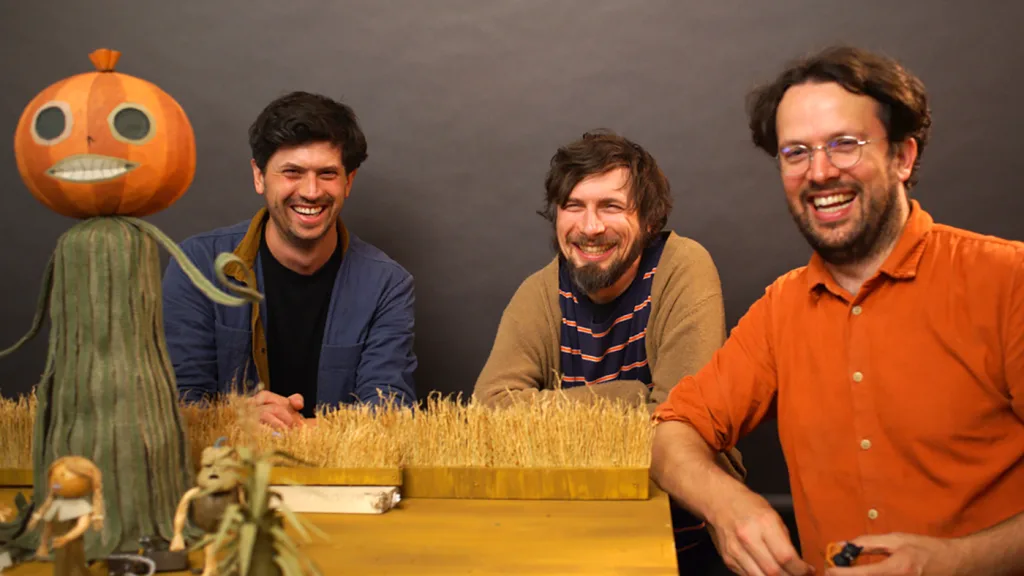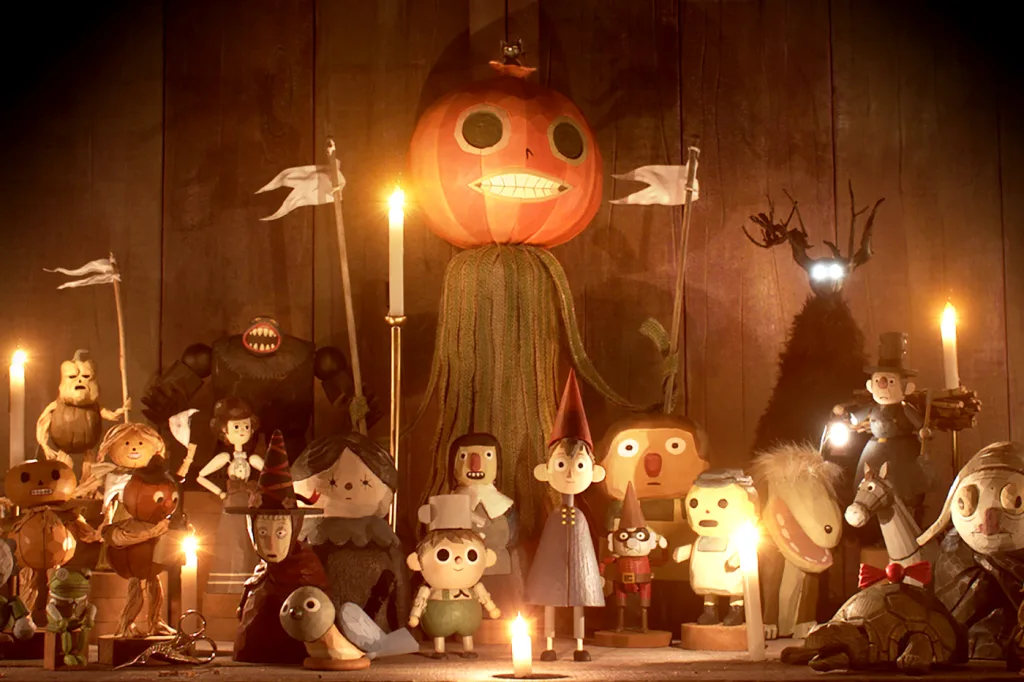November 03, 2024
Wooden puppets and miniature sets: Inside the making of the new ‘Over the Garden Wall’ stop-motion short
Ten years later, Cartoon Network’s autumnal cult classic is returning as a stop-motion short made almost entirely using practical effects.
Since its release in 2014, the Cartoon Network animated series Over the Garden Wall has become something of a cult classic. The 10-episode show follows half-brothers Wirt and Greg on a trek through a magical forest realm called “The Unknown.” It has all the ingredients for an annual fall rewatch: Skeleton jack-o’-lanterns, genuinely foreboding evil forces, beautiful animation, and a thought-provoking storyline. And this year, for the series’s 10-year anniversary, fans will get new Over the Garden Wall content for the first time since its debut.
Today, Cartoon Network and the animation studio Aardman are set to release a three-minute anniversary short in honor of the original show. The short is written by directors Dan Ojari and Mikey Please (who previously cocreated the stop-motion short Robin Robin) alongside the show’s creator Patrick McHale, and it features new voice acting from original cast members including Elijah Wood (of Lord of the Rings fame) as Wirt. Unlike the original series, which was made in a 2D digital animation style, the short is entirely stop-motion.
To reimagine Over the Garden Wall in a new animation medium, Ojari and Please’s team relied almost exclusively on practical effects. Wirt, Greg, and the rest of the cast are hand-carved puppets that stand at a height of several inches (or smaller, in some cases). The sets for the short—which took around two months to build—are ultra-detailed miniaturized scenes, including a full magic forest made to puppet-scale.
We spoke with Ojari and Please to discuss the short’s unique production, the return of the show’s original actors, and some fans’ fear that the short was made using AI.

This interview has been edited and condensed for clarity.
How did the idea for this anniversary short come about?
Ojari: Patrick McHale got in contact with us earlier in the year, around March. He emailed us on a Monday morning, but I guess it came in really early, because we both checked our phones while waking up and saw this email from Pat with this dream proposition. It sort of felt like it was a weird dream—we both came into work like, “Did you get that email as well? Or am I imagining it?” From there we started chatting to Pat about it, and it became clear that it was a real project.
What makes this a dream project for you?
Please: Firstly, it’s an extraordinary show, and everyone who watches it, I think, feels this connection with the idiosyncrasies of it—the beautiful humanity and the folk horror packaged in this really accessible, rich piece of entertainment. Dan and I obviously watched the show when it came out. I think it had this big influence on our work and being able to see the kind of projects that were possible to push into mainstream animation. If you look at some of our other work, like Robin Robin, which we made for Netflix a couple years ago, there are real tones of Over the Garden Wall in there.
Were there any design challenges in translating the characters to stop-motion puppets?
Ojari: Everything in this project actually came together without much friction, which is quite unusual. We worked with Josh and Nathan Flynn, who we’ve worked with in the past—they make character design sculpts. For this project, we were able to work with them throughout the whole process, from figuring out how we translate the characters into 3D through to making the actual puppets and armatures. They’re mega [Over the Garden Wall] fans; Nathan actually sent [Patrick McHale] little Christmas decorations one year.
Please: I should say as well, a lot of our stop motion work is built on a foundation of illustration. We start with a strong graphic base. So translating from Over the Garden Wall was very natural. They’re such iconic characters as well, mainly these primary shapes, so they lent themselves perfectly to this wood look.

How much of the animation is physical versus digital?
Please: The only thing that’s digital is the facial animation. We just finished filming the final shot, and it’s a huge, 10-by-10 square meter forest. We had basically five different rooms with different sets. We have a bunch of little offshoot mini sets as well.
There is a huge VFX team that adds all the atmosphere, and all the characters have these little scaffolding bars that we have to remove because they don’t really stand up very well [in real life]. So there’s loads of VFX in it, but all the sets are real; all the puppets are real. It’s just the faces that are CG.
Ojari: We usually build the world from scratch in a slightly more stylized way, but we wanted to make it feel like this could be a real miniature world, down to the undergrowth of these sets. The art department went out and collected real pieces of wood for it.
Please: There were a few comments on the [announcement] Instagram post thinking it was AI. It was so gutting to see that!
Ojari: The good thing is, we’ve got a [behind-the-scenes video] coming out where we show the process. It kind of feels more important now to document how you make things, and also because I think the craft behind it does show in the end result.
What do you guys think is valuable about going back to these key tenets of animation with puppets and stop-motion?
Please: After releasing that still and seeing the commentary about the AI, in a way it was kind of nice to see, because it’s like, “Oh, no, we’ve actually done the complete opposite.” We couldn’t have devised a more convoluted technique for bringing this world to life. And I think it really shines through.
I think hopefully when you see it, it will have this feeling of being steeped in humanity, which I think is an increasingly rare experience, but it will always be a treasured one. Doing real stuff, for us, is way more fun. Building a big forest with puppets in it is the best way to spend your day. If you were to spend that day crafting your expert prompt . . . that sounds boring as hell.
What did the voicing process look like? Did you get the original actors back in the studio?
Please: Yeah, we did. We got Elijah Woods [as Wirt] back in the studio, and Melanie Lynskey [as Beatrice], and Frank Fairfield [as the narrator/Toymaker]. Collin Dean, who played Greg, has now grown up, so we had a very limited amount of cuts from the original series to build the structure of the story around.
Ojari: What was really nice was being in the room, and it felt like the show was alive again; the characters were alive. And also seeing Patrick—he was loving the fact that it rekindled this wonderful project for a little moment.
Please: After Elijah’s first take, he asked, “How was it?” And Patrick said, “I have no idea, because all I heard was that Wirt’s alive again.”
Can you share any hints on the story?
Please: It’s two things. Its function is primarily to celebrate this beautiful world that Patrick created, and to give the fans who’ve stayed loyal and true to the show over the last 10 years a “thank you” for sticking with these kids through the woods.
But also, because Pat has such a deep appreciation for what the world is, and why we would revisit it, that there’s quite strong overarching themes of lost memories, and things that have moved on but we’re revisiting. If something is gone, is it also forgotten, even though we can’t see it anymore? So there’s these questions raised of, although the series is gone, is it still with us? What does it mean to keep holding onto this world?
So there’s a bit of meta commentary in there.
Please: Yeah, it’s a lot of meta.
Ojari: I suppose it is quite meta. But it also feels like a scene that could’ve played out within the original story, or even after it.
Please: Depending on my mood, when I watch it back, it’s made me cry a couple of times, it’s made me laugh constantly. It does lots of interesting things.
ABOUT THE AUTHOR
(9)